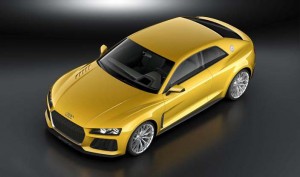With sales slipping to two-decade lows in recent months, the European automotive market has come unplugged – which may be why brands as diverse as BMW, Volkswagen and Porsche are hoping to charge things up with the many hybrids, plug-ins and battery-electric vehicles making their debut at the Frankfurt Motor Show this week.
Manufacturers see a number of potential benefits from electric propulsion, especially in a market where regular unleaded gasoline is going for the equivalent of more than $9 a gallon in some market. The technology also will prove critical if makers hope to meet Europe’s increasingly stringent restrictions on CO2 emissions – a particularly tough challenge for high-line manufacturer like Mercedes-Benz, which will introduce a new plug-in version of its big S-Class sedan at the Frankfurt show.
The range of new battery-based offerings will be “all over the map,” suggested Stephanie Brinley, an industry analyst with IHS Automotive – from the little Volkswagen e-Golf to the plug-in diesel hybrid being introduced by Land Rover for its flagship Range Rover SUV.
Nonetheless, Brinley is among the many skeptics who question just how much of an impact battery technology will have in Europe where, despite sky-high fuel prices, electric propulsion has gained barely as much traction as in the U.S. – less than 4% of the total market.
As in the U.S., price has been a barrier, battery-based vehicles typically starting at several thousand dollars above conventional gasoline systems. The gap is narrower when it comes to an alternative, high-mileage technology – but unlike American drivers, Europeans have fallen in love with the diesel. Make that modern diesels, such as the new Mercedes-Benz E250 BlueTec.
Equipped with turbochargers and high-pressure fuel injection systems, today’s diesels are quiet, clean and surprisingly peppy, while delivering near-hybrid highway mileage – all factors that have helped so-called “oil-burners” garner roughly half of the European market.
The Range Rover hybrid coming to Frankfurt is meant to deliver the best of both technologies, pairing a 288-horsepower turbodiesel with a 47-horsepower electric motor. While it will be able to launch the huge SUV from 0 to 100 kmh (62.5 mph) in just 6.9 seconds, it is expected to also yield 44.1 mpg – roughly what the Toyota Prius of a few years back delivered.
“We are extremely excited” by the benefits the new system will deliver, said John Edwards, Land Rover Global Brand director, noting “The addition of a smooth electric drive enhances refinement, cuts CO2 emissions and delivers staggering performance.”
Combining the words, “performance” and “hybrid” might seem an oxymoron for those more familiar with the battery-based vehicles that have dominated the market in recent years. Models like the Prius and the Nissan Leaf battery-electric vehicle have put a premium on energy efficiency at the expense of spirited acceleration.
But the reality is that electric motors generate their maximum, tire-smoking torque the momentum they begin to spin. It’s all a matter of picking the right batteries and motors, along with some programming tweaks to their electronic controllers.
(To get TDB’s impressions of the 2014 E250 BlueTec 4Matic, Click Here.)
That’s particularly important for high-line manufacturers for whom quick acceleration is as important as leather seats and high-line audio infotainment systems. Manufacturers like Porsche can’t afford to alienate their base even as they stare into the face of restrictive new European Union CO2 standards that could otherwise force them to produce “stone ponies” of their own.
One of the most significant introductions coming to Frankfurt – from a battery-based performance standpoint, anyway – is the new Porsche 918. The carbon-fiber plug-in hybrid is rated at 78 mpg – and will get about 18 miles per charge on its lithium-ion battery pack, but it will also launch from 0 to 60 in less than 2.8 seconds. A Chevrolet Volt it definitely isn’t. Especially from a price standpoint, at $845,000
But Frankfurt’s battery fix won’t be limited to the moneyed classes. Makers also will be targeting those who actually have to worry about the cost of fuel. There’ll be two new pure battery-electric offerings from Volkswagen – which also owns Porsche and Audi, the latter introducing its own 700-horsepower performance hybrid.
(Click Here for an early look at Audi’s new drop top debuting at Frankfurt.)
For more mainstream markets, VW will be launching the e-Up!, an all-electric version of its microcar, and a battery-electric e-Golf. They’re expected to cut fuel costs by as much as two-thirds compared to the same models equipped with mid-range gasoline engine.
“We’re seeing a natural progression of battery technology as it’s applied to a wider spectrum of products,” Brinley said.
Whether that will bring buyers back to showrooms in such a seriously distressed car market remains to be seen, but manufacturers are clearly plugging into battery power and hoping European motorists will be charged up, as well.

